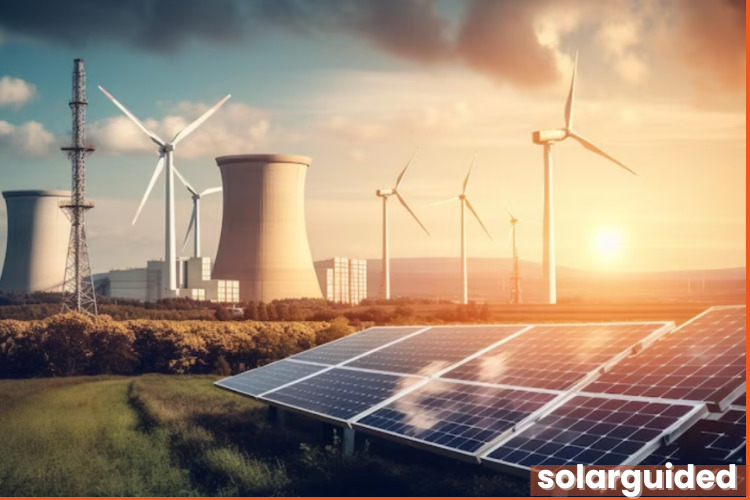Introduction:
Solar energy is a great alternative because it’s clean, never runs out, and is becoming cheaper to use. It doesn’t pollute the air or water, unlike some other sources, and the sun will keep shining for a long time!
As the world grapples with climate change and the need for cleaner energy sources, solar energy has emerged as a strong contender. But what exactly makes it such a viable alternative to traditional fossil fuels?

1. Renewable and Abundant:
Unlike fossil fuels which are finite resources, the sun’s energy is constantly replenished, making solar power a renewable source. This means we can harness its power without worrying about running out, ensuring sustainable energy production for generations to come. Additionally, the sun shines brightly in most parts of the world, making it a widely available resource, regardless of location.
2. Clean and Environmentally Friendly:
Unlike traditional power plants fueled by coal or oil, solar energy production generates no harmful emissions like greenhouse gases or pollutants. This significantly reduces its contribution to air and water pollution, creating a cleaner and healthier environment for everyone. Moreover, solar panels require minimal water for operation, further minimizing its environmental impact.
3. Cost-Effective and Efficient:
The price of solar panels and installation has decreased significantly in recent years, making it a more cost-competitive option compared to traditional power sources. As technology continues to improve, we can expect further price reductions, making solar energy even more accessible in the future. Additionally, solar panels require minimal maintenance, further reducing operating costs over time.
4. Decentralized and Scalable:
Unlike traditional centralized power plants, solar energy can be generated locally, closer to the point of use. This decentralized approach reduces reliance on long-distance power lines, minimizing energy losses during transmission. Additionally, solar power can be scaled to meet individual needs. From powering a single home with rooftop panels to large-scale solar farms generating electricity for entire communities, solar energy offers a flexible solution for various energy requirements.
5. Job Creation and Economic Growth:
The solar energy industry is experiencing rapid growth, leading to the creation of new jobs across various sectors, including manufacturing, installation, and maintenance. This not only benefits individuals but also contributes to the economic development of local communities and nations. Investing in solar energy presents a valuable opportunity to create a sustainable and thriving economy.
6. Energy Security and Independence:
By harnessing the power of the sun, nations can reduce their reliance on imported fossil fuels, contributing to greater energy security and independence. This reduces vulnerability to price fluctuations and political instability in oil-producing regions. Additionally, locally generated solar energy provides communities with greater control over their energy needs and contributes to a more resilient energy infrastructure.
Challenges and Addressing Them:
Although solar energy offers a promising alternative, it is important to acknowledge its current challenges:
- Intermittency: Sunlight is not available 24/7, making solar energy intermittent. This necessitates the development of efficient energy storage solutions to capture excess solar energy during peak hours and utilize it during nighttime or periods of low sunlight.
- Initial Investment: While the long-term benefits outweigh the initial cost, the upfront cost of installing solar panels can still be a barrier for some individuals and communities. Ongoing government incentives and financing options can help address this challenge and make solar energy more accessible.
- Land Use: Large-scale solar farms require significant land area, which may raise concerns about land use, especially in densely populated regions. However, advancements in solar panel design and efficiency can help reduce the amount of land needed, while exploring options like rooftop solar and integrating solar arrays with other land uses can further optimize space utilization.

Conclusion:
Despite its challenges, the immense benefits of solar energy make it a clear viable alternative to traditional fossil fuels. With continued technological advancements, cost reductions, and effective policy measures, solar energy has the potential to play a critical role in shaping a cleaner, more sustainable, and secure energy future for our planet.
By harnessing the power of the sun, we can illuminate a brighter path forward, not only for ourselves but also for generations to come.
FAQs:
1. Does solar power work at night?
No, solar panels need sunlight to generate electricity. However, you can store excess solar energy during the day using batteries and then use it at night or during cloudy periods.
2. How long do solar panels last?
Solar panels typically last for 25 to 35 years, and they continue to generate electricity at a slightly reduced rate even after that.
3. Can solar panels handle harsh weather?
Yes, solar panels are designed to withstand rain, snow, wind, and hail. They are made from durable materials and can handle most weather conditions.
4. Is my roof suitable for solar panels?
Most roofs are suitable for solar panels, as long as they are south-facing and receive sufficient sunlight. A qualified installer can assess your roof to determine its suitability.
5. How much can I save on my electricity bill with solar panels?
The amount you save will depend on the size of your system, your electricity usage, and your local electricity rates. However, many people see significant reductions in their electricity bills after installing solar panels.